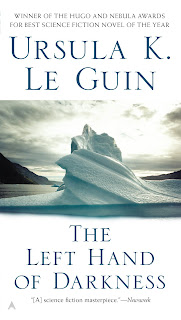Book Review: The Left Hand of Darkness by Ursula K. Le Guin (1969)
It was back the classics for my next read, or at least what was reported to be sci-fi classic by many reviewers...
The Left Hand of Darkness is the story of The Envoy, Genly Ai, a representative of a confederation of planets seeking to bring a new world, Gethen (aka Winter per its near perpetual frozen state) into the confederation. The Envoy is stymied by cultures he struggles to understand, cultures which are based around the fact that its otherwise human inhabitants can be male of female once a moth depending on their hormones; the inhabitants are ambisexual. Strangely, this book is reportedly not only a sci-fi classic but a feminist classic, though not only did I struggle to find the (modern) feminist message, the fact that Gethen's inhabitants are ambisexual really doesn't figure into the plot beyond The Envoy failing to understand the nuances of behavior of the people he's dealing with (which you would think any alien ambassador would be better at).
Eventually, because The Envoy has aligned unwittingly with the wrong person - the Prime Minister of the region he landed in, Estraven - he leaves the land he's in and travels to interior lands that are thawing out in hopes of an alliance elsewhere. Meanwhile, Estraven, having incurred the wrath of an unsteady king, is exiled and travels to the same lands and winds up working for those leaders. When The Envoy runs afoul of those leaders, Estraven goes to great lengths to save him and the book begins to focus on their relationship as they make a journey of redemption, though they surprisingly never fall in love which I suspected would happen given Estraven's unusually biology and The Envoy's career-induced celibacy. While the possibility is teased, their relationship winds up ending on a more realistic note.
While the storytelling and worldbuilding is top notch, the most unusual thing about the book - the ambisexual inhabitants of Gethen - never really matters, except to show us, through Estraven, that sometimes possessing both male and female qualities, is necessary to survival. This was interesting and fortunately Le Guin doesn't hit us over the head with it, and this is what we should expect from good fiction, subtlety.
The book did lose points with me for dragging it's feet at times - a perilous journey through the northlands goes on entirely too long - and because I could not get behind The Envoy who did not seem up to the the tasks his position required. Otherwise, the book is a fine read.
Final Score: 7/10




Comments
Post a Comment